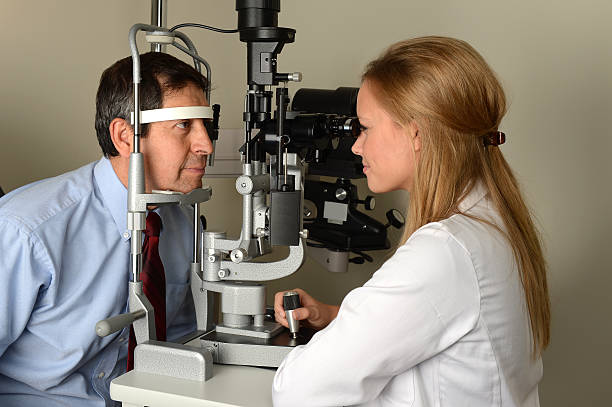Macular degeneration is a leading cause of vision loss, particularly in adults over 50. This progressive eye condition affects the macula—the part of the retina responsible for sharp central vision—making everyday activities like reading, driving, and recognizing faces more challenging.
While there is no cure, early detection, a nutrient-rich diet, protective eyewear, and healthy lifestyle choices can help slow its progression. Regular eye exams and proper eye care are essential for maintaining vision and reducing the risk of severe sight loss.
What Is Macular Degeneration?
Macular degeneration, also called age-related macular degeneration (AMD), occurs when the macula deteriorates over time. This condition can make it hard to see fine details, read, or recognize faces. There are two types:
- Dry AMD – More common, it happens when small yellow deposits called drusen build up under the retina, leading to gradual vision loss. Over time, the macula can thin and stop working properly.
- Wet AMD – Less common but more serious, it involves abnormal blood vessels growing under the retina. These vessels can leak blood or fluid, causing damage and rapid vision loss if left untreated.

Ways to Slow Down Macular Degeneration
While AMD cannot be reversed, the right lifestyle changes and treatments can help slow its progression and protect your vision for as long as possible.
1. Eat a Healthy Diet
A well-balanced diet rich in antioxidants, vitamins, and minerals can help support eye health and reduce AMD risk. Focus on:
- Leafy greens like spinach, kale, and collard greens, which contain lutein and zeaxanthin—nutrients that protect the retina.
- Fish such as salmon, tuna, and sardines, which are high in omega-3 fatty acids known to reduce inflammation and support eye function.
- Nuts and seeds, including almonds, walnuts, and sunflower seeds, which provide vitamin E and zinc, essential for eye health.
- Fruits and vegetables, especially those rich in vitamin C (like oranges and strawberries) and beta-carotene (like carrots and sweet potatoes), which help fight oxidative stress.
2. Take Eye Health Supplements
If getting enough nutrients from food alone is challenging, consider taking eye health supplements. The AREDS2 formula, recommended by researchers, includes:
- Vitamin C – Helps prevent oxidative damage.
- Vitamin E – Supports cell health.
- Zinc – Essential for maintaining the structure of the retina.
- Copper – Needed for proper cellular function.
- Lutein & Zeaxanthin – Help filter harmful blue light and protect eye tissues.
Consult your doctor before starting any supplements to ensure they are appropriate for your health needs.
3. Protect Your Eyes from UV Light

Long-term exposure to ultraviolet (UV) rays can harm the retina and contribute to AMD progression. To protect your eyes:
- Wear sunglasses that block 100% of UVA and UVB rays whenever you’re outdoors.
- Consider wearing wide-brimmed hats for extra sun protection.
- Use blue-light-blocking glasses when looking at screens for long periods.
4. Quit Smoking
Smoking is one of the biggest risk factors for AMD. It reduces blood flow to the eyes and increases oxidative damage, making AMD progress faster. Quitting smoking can:
- Lower your AMD risk.
- Improve oxygen flow to the eyes.
- Reduce damage to the retina.
Even if you’ve been smoking for years, stopping now can still protect your vision.
5. Manage Other Health Conditions
Chronic health problems like high blood pressure, diabetes, and high cholesterol can increase the risk of AMD or make it worse. To help keep your eyes healthy:
- Maintain a balanced diet and regular exercise routine.
- Monitor and control your blood pressure and cholesterol levels.
- Manage diabetes properly to prevent complications that affect vision.
6. Get Regular Eye Exams

Seeing an eye doctor regularly is one of the best ways to catch AMD early and take action before it worsens. Comprehensive eye exams can:
- Detect AMD in its early stages.
- Track changes in your vision over time.
- Allow for early treatment, such as anti-VEGF injections (for wet AMD) or laser therapy.
If you notice blurry vision, dark spots in your central vision, or trouble recognizing faces, schedule an eye exam right away.
Conclusion
Macular degeneration can have a major impact on your daily life, but proactive steps can help slow its progression and preserve your vision. Eating a nutrient-rich diet, taking eye-healthy supplements, wearing UV-protective sunglasses, quitting smoking, and managing underlying health conditions all play a key role in protecting your eyesight. Regular eye exams are essential for early detection and treatment.
If you experience any vision changes, don’t delay—schedule an appointment with an eye doctor right away. By making smart lifestyle choices and prioritizing eye care, you can support long-term vision health and reduce the effects of AMD.

